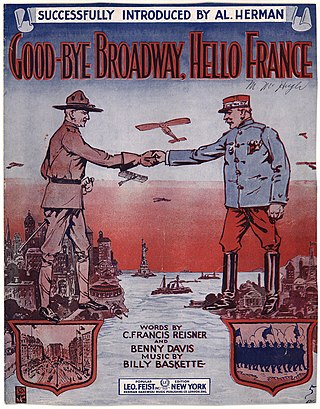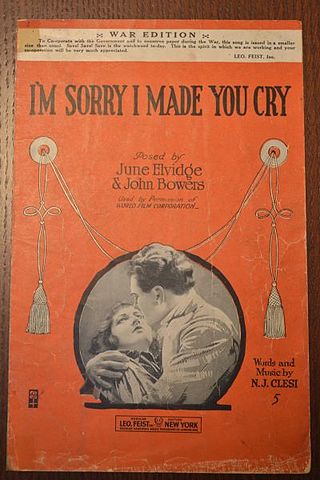
Geoffrey O'Hara was a Canadian American composer, singer and music professor.
Fred Fisher was a German-born American songwriter and Tin Pan Alley music publisher.

Tin Pan Alley was a collection of music publishers and songwriters in New York City that dominated the popular music of the United States in the late 19th and early 20th centuries. It originally referred to a specific place: West 28th Street between Fifth and Sixth Avenues in the Flower District of Manhattan; a plaque on the sidewalk on 28th Street between Broadway and Sixth commemorates it.

Lew Brown was a lyricist for popular songs in the United States. During World War I and the Roaring Twenties, he wrote lyrics for several of the top Tin Pan Alley composers, especially Albert Von Tilzer. Brown was one third of a successful songwriting and music publishing team with Buddy DeSylva and Ray Henderson from 1925 until 1931. Brown also wrote or co-wrote many Broadway shows and Hollywood films. Among his most-popular songs are "Button Up Your Overcoat", "Don't Sit Under the Apple Tree", "Life Is Just a Bowl of Cherries", "That Old Feeling", and "The Birth of the Blues".

Theodore F. Morse was an American composer of popular songs.
"At Mail Call Today" is a song written by American country music artist Gene Autry and Fred Rose. The two had a successful song writing partnership dating back to 1941, including "Be Honest With Me", "Tweedle-O-Twill" and "Tears On My Pillow". Rose, with Roy Acuff, founded Acuff-Rose Music Publishing in 1942, and in 1947, would go on to producing Hank Williams. Autry, after a brief lull in film making due to WWII, would be back to his pre-war output by 1946.
The music of World War I is the music which was composed during the war or which is associated with the war.

Good-Bye Broadway, Hello France is a 1917 song composed by Billy Baskette, with lyrics written by C. Francis Reisner and Benny Davis. The song was published by Leo Feist, Inc.
"A Soldier Speaks" is a song from 1944, with music and lyrics by Peter DeRose, and published by Robbins Music Corp.
"We're Going Over the Top" is a World War I song written by Andrew B. Sterling, Bernie Grossman, and Arthur Lange. It was published in 1917 by Joe Morris Music Co., in New York, NY. The sheet music cover, designed by Starmer, illustrates a battlefield scene with a tank moving over the top of a trench and soldiers inside the trench getting out of the way of the tank. Behind the tank soldiers march up the field.

"The Dream of a Soldier Boy" is a World War I song written by Al Dubin and composed by James V. Monaco. It was published in 1917 by Witmark & Sons in New York City. The sheet music cover depicts a photo of a soldier embracing his mother while a proud father and others look on.

Some Lonesome Night is a song by George W. Meyer with lyrics by Grant Clarke and George Whiting. It was published in 1918 by Leo Feist Inc.

Swanee Shore: is a song composed by Sidney D. Mitchell, Arthur Fields and Irving Kaufman in 1919 and published by Leo Feist Inc.

"I Ain't Got Weary Yet!" is a World War I song written by Howard Johnson and composed by Percy Wenrich. It was published in 1918 by Leo Feist Inc., in New York City. The sheet music cover depicts Americans overtaking Germans while a plane flies overhead. Three vignettes depict soldiers digging, a soldier holding his bride, and a nurse tending to a wounded soldier.

"I'm Sorry I Made You Cry" is a World War I song written and composed by N.J. Clesi. It was published in 1918 by Leo Feist, Inc. in New York, NY. The sheet music cover depicts a soldier embracing a woman.

Johnny's in Town is a World War I song written by Jack Yellen and composed by George W. Meyer & Abe Olman. This song was published in 1919 by Leo. Feist, Inc., in New York, NY. The sheet music cover, illustrated by Rosenbaum Studios, depicts a cartoon soldier winking with women in the background.

"Mother, Here's Your Boy!" is a World War I song written and composed by Sidney D. Mitchell, Archie Gottler, and Theodore Morse. This song was published in 1918 by Leo. Feist, Inc., in New York, NY. The sheet music cover depicts Uncle Sam presenting a returning soldier to his mother with the Statue of Liberty and ships in the background.
"Goodbye Mama (I'm off to Yokohama)" is a World War II song written and composed by J. Fred Coots. The wartime song was first published in 1941 by Chappell and Co. in New York, NY. The song has a march-tempo, 4/4 meter with some syncopated rhythm. The tune is cheery and akin to a Boy Scout hiking song.
Salvation Lassie Of Mine is a World War I song written by Jack Caddigan and Chick Story. The song was first published in 1919 by Leo Feist, Inc. in New York, NY. The sheet music cover features a photo of a Salvation Army nurse with soldiers entering a Salvation Army hut. This song was in the top 20 charts in March and April 1919, reaching number 18 in April.
We'll Knock The Heligo—Into Heligo—Out Of Heligoland! is a World War I song written by John J. O'Brian and composed by Theodore Morse. The song was first published in 1917 by Leo Feist Inc., in New York, NY. The sheet music cover depicts a terrified Kaiser standing on a cliff with a city below and United States soldiers rushing toward him.













